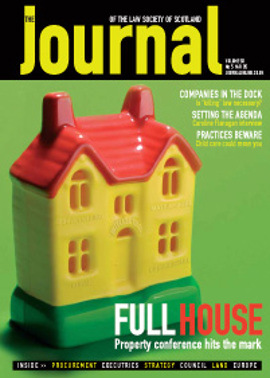A fine Profile

A recent decision of one of the Scottish IP judges, Lord Kingarth, adopts a commercial and practical interpretation of various intellectual property agreements and raises interesting questions on software copyright generally. In Profile Software Ltd v Becogent Ltd [2005] CSOH 28 (16 February 2005) the court chose not to apply a strict literal interpretation to the agreements, to avoid an absurd situation where no party would have been able to enforce them on the basis that title to sue under a software licence and interest in enforcing the licence separately vested in two parties.
Profile commenced proceedings for infringement of copyright, alleging that Becogent had breached the terms of a software licence. Before the issue of infringement could go to proof, Becogent requested a preliminary proof to challenge Profile’s title to enforce the licence terms. Becogent argued that Profile had no title to enforce the terms of the licence agreement, which had been granted by a liquidator.
The title to the software was originally owned by Coranta Corporation Ltd (“the company”). In July 2001 the company went into liquidation and the liquidator was appointed to realise assets. Profile’s parent company purchased the company’s assets including all intellectual property in the software. The purchase was subject to existing licences to use the software granted to third parties including Becogent. The terms of each licence were adjusted on an urgent basis between the liquidator of the company, the licensee and the pursuers as owners of the copyright. On the same date as the licences were granted, the company transferred all intellectual property in various assets including the software to Profile, but expressly excluded “any asset or right not expressly sold to the Purchaser” (the pursuers). There was an express assignation of the copyright in the software from the company to Profile, but no such express assignation of the specific licences.
Becogent argued that Profile had no title to enforce the licence, as although copyright in the software had been assigned to Profile, the actual licence and rights to enforce its terms had not been expressly referred to either in the assignation or sale agreement. Profile’s position was that these agreements could and did transfer to them all rights in the software, including the right to enforce the licence. They also argued as a matter of general law that the right to enforce a licensee’s obligations under a licence should pass with the transmission of the copyright.
It was held that Profile did have title to enforce the licence. Whilst Lord Kingarth did not consider there to be any real weight in Becogent’s arguments of strict literal interpretation, he stated that it was not unreasonable to start from the supposition that parties involved in revising the licence “would have been disinclined to achieve the result that no-one could be said to have both title and interest to enforce the continuing obligations of the licence”. The absurdity of the defenders’ argument would be that whilst Profile as copyright owners had a clear interest to enforce the licence, they would have no title to do so, whereas the liquidator would have had title but no interest after realisation of the company’s assets.
It was concluded that the terms of the assignation were wide enough to cover the transfer of the company’s rights to enforce compliance with the licence and that clearly a software licence was essentially a copyright licence. Whilst at this preliminary stage no formal concluded view was given on Profile’s proposition that the right to enforce a licensee’s obligations under a licence would automatically pass with transmission of the copyright, Lord Kingarth did find this submission “entirely persuasive”.
It was taken into account that the agreements were drafted as a matter of urgency at the time of the liquidation of the company and accepted that in reality precise literal interpretation of every clause and the practical effect they could have would not have been contemplated or possible. It is to be welcomed that the judge regarded it as important to achieve a commercial decision in tune with the parties’ real intentions and the reality of the situation.
Robert Buchan and Gill Grassie, Intellectual Property and Technology Department, Maclay Murray & Spens
In this issue
- Leaving on a high
- The JAB: why it isn't working
- One house, many rooms
- Bad company
- Tender and true
- Beware the pitfalls
- Alien investors in the US
- Budgeting and beyond
- Let's play tag
- Same old story
- Getting the message across
- Council life
- Should the party pay?
- Unintended effects?
- A fine Profile
- Public benefit?
- The appeal of leave
- When is a cost not an expense?
- Website reviews
- Book reviews
- What a waste!
- How safe are your titles?






